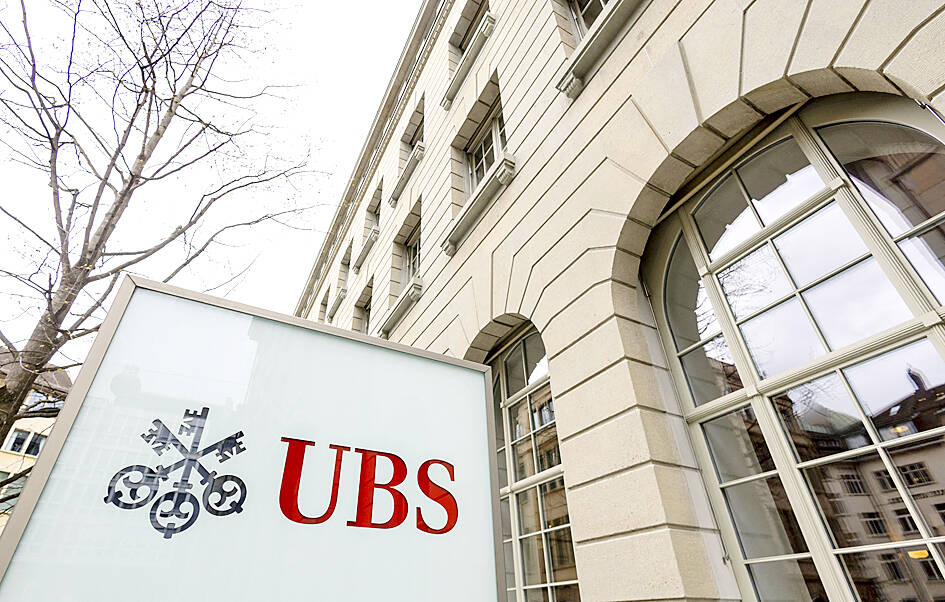UBS Group AG is gearing up for an estimated US$34.8 billion gain as a result of its emergency takeover of Credit Suisse Group AG, while saying that it faces billions in potential legal and regulatory costs from the rescue of its stricken former rival.
The Swiss bank stands to benefit from the combined firms’ negative goodwill, based on a first assessment it has made on data as of the end of last year, it said in a regulatory filing posted overnight in Switzerland.
UBS is also estimating that litigation, regulatory matters and related liabilities could take a bite of as much as US$4 billion out of capital over 12 months.

Photo: Reuters
The figures are based on the bank’s best estimates now, and as further analyses are performed, the figure is likely to change, UBS said.
Bloomberg had previously reported that the bank could make a gain of as much as 51 billion Swiss francs (US$56.8 billion) from the negative goodwill, calculated on the value of Credit Suisse assets at the end of March.
UBS agreed to take over Credit Suisse this year in an emergency sale backed by the Swiss government, amid fears that the smaller troubled competitor was hurtling toward bankruptcy. Analysts have pointed out that Credit Suisse’s local business, Swiss Universal Bank, is probably worth multiple times what UBS paid for it.
Still, if UBS reports a windfall from negative goodwill, many investors are likely to view it as an accounting quirk rather than a sign of strength of the underlying business.
Executives, aware that a paper windfall could prove unpopular in Switzerland, have also been quick to point out the risks they are taking on in an integration that might take several years.
The accounting gain stands to be among the biggest ever reported by a bank in a single quarter, potentially easily surpassing the previous benchmark. JPMorgan Chase & Co’s US$14.3 billion profit in the first quarter of 2021 is the modern record for US and European lenders.
Unlike in more standard acquisitions, UBS was unable to conduct a months-long review of the bank’s books.
UBS has sent in a so-called clean team to assess its former rivals’ client rosters and talent, as well as which business lines should be earmarked for a wind-down unit, people with knowledge of the matter have said.
Credit Suisse had a long list of legal entanglements that might end up costing UBS.

With an approval rating of just two percent, Peruvian President Dina Boluarte might be the world’s most unpopular leader, according to pollsters. Protests greeted her rise to power 29 months ago, and have marked her entire term — joined by assorted scandals, investigations, controversies and a surge in gang violence. The 63-year-old is the target of a dozen probes, including for her alleged failure to declare gifts of luxury jewels and watches, a scandal inevitably dubbed “Rolexgate.” She is also under the microscope for a two-week undeclared absence for nose surgery — which she insists was medical, not cosmetic — and is

CAUTIOUS RECOVERY: While the manufacturing sector returned to growth amid the US-China trade truce, firms remain wary as uncertainty clouds the outlook, the CIER said The local manufacturing sector returned to expansion last month, as the official purchasing managers’ index (PMI) rose 2.1 points to 51.0, driven by a temporary easing in US-China trade tensions, the Chung-Hua Institution for Economic Research (CIER, 中華經濟研究院) said yesterday. The PMI gauges the health of the manufacturing industry, with readings above 50 indicating expansion and those below 50 signaling contraction. “Firms are not as pessimistic as they were in April, but they remain far from optimistic,” CIER president Lien Hsien-ming (連賢明) said at a news conference. The full impact of US tariff decisions is unlikely to become clear until later this month

GROWING CONCERN: Some senior Trump administration officials opposed the UAE expansion over fears that another TSMC project could jeopardize its US investment Taiwan Semiconductor Manufacturing Co (TSMC, 台積電) is evaluating building an advanced production facility in the United Arab Emirates (UAE) and has discussed the possibility with officials in US President Donald Trump’s administration, people familiar with the matter said, in a potentially major bet on the Middle East that would only come to fruition with Washington’s approval. The company has had multiple meetings in the past few months with US Special Envoy to the Middle East Steve Witkoff and officials from MGX, an influential investment vehicle overseen by the UAE president’s brother, the people said. The conversations are a continuation of talks that

CHIP DUTIES: TSMC said it voiced its concerns to Washington about tariffs, telling the US commerce department that it wants ‘fair treatment’ to protect its competitiveness Taiwan Semiconductor Manufacturing Co (TSMC, 台積電) yesterday reiterated robust business prospects for this year as strong artificial intelligence (AI) chip demand from Nvidia Corp and other customers would absorb the impacts of US tariffs. “The impact of tariffs would be indirect, as the custom tax is the importers’ responsibility, not the exporters,” TSMC chairman and chief executive officer C.C. Wei (魏哲家) said at the chipmaker’s annual shareholders’ meeting in Hsinchu City. TSMC’s business could be affected if people become reluctant to buy electronics due to inflated prices, Wei said. In addition, the chipmaker has voiced its concern to the US Department of Commerce